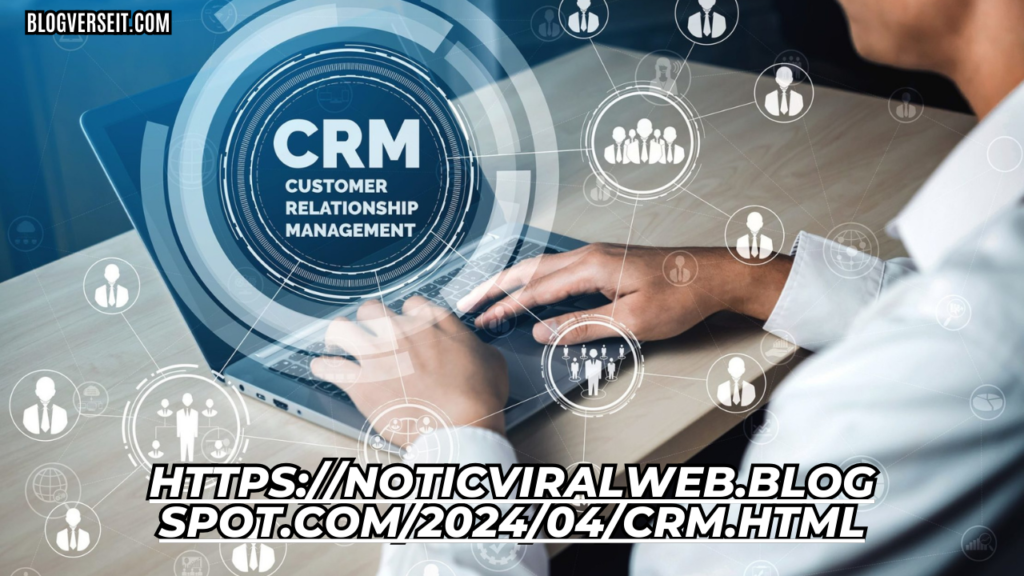Introduction
The https://noticviralweb.blogspot.com/2024/04/crm.html , Notic Viral Web discusses Customer Relationship Management (CRM) systems, highlighting their importance in managing a company’s interactions with current and potential customers. It explains how CRM software helps businesses streamline processes, improve customer service, and enhance sales through effective data management and analysis.
The piece also emphasizes the benefits of CRM tools in fostering better communication, tracking customer interactions, and ultimately driving business growth by building stronger customer relationships. Overall, it serves as an informative overview for those looking to understand the role of CRM in modern business practices.
What Is a CRM System?
A CRM system is a software platform that helps businesses manage interactions with customers and potential clients. It centralizes customer data, making it easier for businesses to track customer history, preferences, and behavior. CRM systems also allow businesses to automate various tasks, such as sales tracking, customer support, and marketing campaigns, ensuring a seamless and personalized experience for each customer.
By providing a 360-degree view of each customer, CRM systems empower businesses to make informed decisions that improve customer satisfaction and loyalty. These platforms offer a range of features, from contact management and sales automation to marketing tools and analytics, allowing businesses to tailor their approach to individual customer needs.
The Evolution of CRM Systems
CRM systems have come a long way since their inception in the 1980s. Initially, businesses relied on simple customer databases to store information. Over time, the need for more advanced tools led to the development of software solutions that could manage not only customer information but also sales processes, marketing efforts, and customer support.
The advent of cloud computing further revolutionized CRM systems, making them more accessible to businesses of all sizes. Today, most CRM platforms are cloud-based, allowing businesses to access customer data and tools from anywhere, at any time. This shift has enabled businesses to be more agile and responsive to customer needs, driving higher engagement and satisfaction.https://noticviralweb.blogspot.com/2024/04/crm.html.
Key Features of CRM Systems
CRM systems come packed with features designed to streamline business operations and enhance customer relationships. Some of the most important features include:
Contact Management
At the core of any CRM system is contact management. This feature allows businesses to store and organize customer information, such as names, contact details, and interaction history. With all customer data in one place, teams can easily access important information, ensuring consistent and personalized communication across different departments.
Sales Automation
Sales automation tools help businesses manage their sales pipelines more efficiently. CRM systems automate tasks like follow-up emails, lead scoring, and deal tracking, allowing sales teams to focus on building relationships and closing deals. By automating repetitive tasks, CRM systems free up time and resources, enabling businesses to close more sales faster.
Marketing Automation
CRM systems offer powerful marketing automation tools that allow businesses to segment their audience, create personalized marketing campaigns, and track campaign performance. These tools help businesses deliver targeted content to the right audience at the right time, increasing the effectiveness of their marketing efforts.
Customer Support Tools
A strong CRM system includes customer support tools that help businesses manage inquiries and complaints efficiently. With features like ticketing systems, live chat, and customer portals, businesses can provide timely and effective support, improving customer satisfaction and retention.https://noticviralweb.blogspot.com/2024/04/crm.html.
Analytics and Reporting
CRM systems come equipped with advanced analytics and reporting tools that provide valuable insights into customer behavior and business performance. These tools allow businesses to track key metrics, such as sales performance, customer acquisition costs, and customer lifetime value. By analyzing this data, businesses can make data-driven decisions that improve overall performance and profitability.
Why CRM Systems Are Essential for Modern Businesses
CRM systems have become a crucial part of modern business strategies for several reasons. They provide businesses with the tools and insights needed to build stronger customer relationships, increase efficiency, and drive growth. Here are some key reasons why every business should consider implementing a CRM system:
Improved Customer Relationships
Building strong customer relationships is essential for long-term business success. CRM systems allow businesses to deliver personalized experiences by storing and analyzing customer data. This information helps businesses understand customer needs, preferences, and pain points, allowing them to provide tailored solutions that improve customer satisfaction and loyalty.
Streamlined Operations
CRM systems automate various business processes, such as sales tracking, marketing campaigns, and customer support. By automating these tasks, businesses can reduce manual work and minimize the risk of human error. This leads to more efficient operations and better use of resources.
Better Collaboration Across Teams
A CRM system provides a centralized platform where teams can access customer information and collaborate more effectively. Sales, marketing, and customer support teams can all work from the same data, ensuring consistent communication and a unified customer experience. This level of collaboration helps businesses deliver better results and avoid miscommunication or duplication of efforts.
Enhanced Customer Retention
Customer retention is crucial for business growth, as retaining existing customers is more cost-effective than acquiring new ones. CRM systems help businesses stay in touch with customers by automating follow-up emails, reminders, and loyalty programs. This level of engagement helps businesses maintain strong relationships with their customers, leading to higher retention rates.https://noticviralweb.blogspot.com/2024/04/crm.html.
Data-Driven Decision Making
In today’s competitive landscape, data is a valuable asset. CRM systems provide businesses with detailed insights into customer behavior and business performance. By analyzing this data, businesses can make informed decisions that improve overall strategy and performance. From identifying high-value customers to spotting sales trends, CRM systems give businesses the tools they need to stay ahead of the competition.
Benefits of Implementing a CRM System
Implementing a CRM system can have a transformative effect on your business. Here are some of the key benefits that businesses can expect when they integrate a CRM platform into their operations:
Increased Sales
By providing sales teams with detailed customer insights and automating sales processes, CRM systems help businesses close deals faster and more efficiently. Sales automation tools ensure that no leads slip through the cracks, while lead scoring features help sales teams prioritize high-potential opportunities.https://noticviralweb.blogspot.com/2024/04/crm.html.
Improved Marketing Campaigns
CRM systems give marketers the ability to create personalized campaigns based on customer data. By segmenting their audience and delivering targeted content, businesses can increase engagement and improve the ROI of their marketing efforts. CRM systems also provide real-time data on campaign performance, allowing marketers to make adjustments and optimize their strategies for better results.
Better Customer Support
Customers expect quick and effective support when they encounter problems. CRM systems offer customer support tools that help businesses respond to inquiries and resolve issues faster. With features like ticketing systems and live chat, businesses can ensure that customer support teams have all the information they need to provide excellent service.https://noticviralweb.blogspot.com/2024/04/crm.html.
Higher Productivity
CRM systems automate repetitive tasks, such as data entry, follow-up emails, and reporting. By reducing the amount of manual work required, businesses can improve productivity and allow employees to focus on more strategic tasks. This not only leads to better performance but also boosts employee morale and job satisfaction.
Stronger Customer Loyalty
Loyal customers are more likely to make repeat purchases and recommend your business to others. CRM systems help businesses nurture customer relationships by providing personalized experiences and timely follow-ups. By staying engaged with customers and addressing their needs proactively, businesses can build stronger loyalty and increase customer lifetime value.
Types of CRM Systems
There are several types of CRM systems available, each catering to different business needs. Understanding the differences between these systems can help you choose the right one for your business.
Operational CRM
Operational CRM systems focus on automating and streamlining business processes related to customer interactions. These systems are ideal for businesses looking to improve their sales, marketing, and customer support efforts. Operational CRM systems provide tools for lead management, contact management, and customer service automation.https://noticviralweb.blogspot.com/2024/04/crm.html.
Analytical CRM
Analytical CRM systems specialize in analyzing customer data and providing valuable insights. These systems are ideal for businesses that want to make data-driven decisions based on customer behavior and preferences. Analytical CRM systems include advanced reporting and analytics tools that help businesses understand trends, identify high-value customers, and optimize their marketing efforts.
Collaborative CRM
Collaborative CRM systems focus on improving communication and collaboration between different departments within a business. These systems provide a centralized platform where teams can share customer information and work together to provide a unified customer experience. Collaborative CRM systems are ideal for businesses with multiple departments that need to work together on customer-related tasks.https://noticviralweb.blogspot.com/2024/04/crm.html .
Choosing the Right CRM System for Your Business
When choosing a CRM system, it’s important to consider your business’s unique needs and goals. Here are some factors to consider when selecting a CRM platform:
Size of Your Business
The size of your business will play a significant role in determining the type of CRM system you need. Small businesses may benefit from a simple, easy-to-use CRM platform that focuses on contact management and basic automation. Larger businesses, on the other hand, may require more advanced CRM systems with robust analytics, sales automation, and marketing tools.
Features and Functionality
Different CRM systems offer different features, so it’s essential to choose a platform that meets your specific needs. Consider the key features that are most important to your business, such as sales automation, marketing tools, or customer support features. Make sure the CRM system you choose offers the functionality required to achieve your business goals.https://noticviralweb.blogspot.com/2024/04/crm.html.
Integration with Existing Tools
Your CRM system should integrate seamlessly with the other tools and software your business uses. This includes email platforms, marketing automation tools, accounting software, and more. Integrations allow you to streamline your operations and ensure that all your business systems work together efficiently.
Scalability
As your business grows, your CRM system needs to grow with it. Choose a CRM platform that offers scalability, allowing you to add more users, features, and functionality as your business expands. A scalable CRM system ensures that you won’t outgrow your platform and will continue to meet your needs as your business evolves.https://noticviralweb.blogspot.com/2024/04/crm.html.
Budget
CRM systems come at various price points, so it’s important to choose a platform that fits within your budget. While some CRM systems offer free or low-cost options for small businesses, more advanced systems may come with a higher price tag. However, investing in the right CRM system can lead to significant long-term benefits, such as increased sales and improved customer retention.
The Future of CRM Systems
CRM systems will continue to evolve as technology advances, offering even more powerful tools and features for businesses. Some key trends shaping the future of CRM systems include:
Artificial Intelligence (AI) Integration
AI will play a significant role in the future of CRM systems, enabling businesses to automate more tasks and gain deeper insights into customer behavior. AI-powered tools, such as chatbots, predictive analytics, and machine learning, will allow businesses to deliver more personalized experiences and improve customer satisfaction.
Mobile CRM
As more employees work remotely or on the go, mobile CRM systems will become increasingly important. Mobile CRM platforms allow sales teams, marketers, and customer support agents to access customer information and tools from their smartphones or tablets, ensuring they can stay productive no matter where they are.https://noticviralweb.blogspot.com/2024/04/crm.html.
Enhanced Data Security
With the growing importance of data privacy, CRM systems will place a greater emphasis on security features. Businesses will need to ensure that customer data is protected from breaches and unauthorized access, especially as they collect and store more information through their CRM platforms.
Conclusion
CRM systems have become essential tools for businesses looking to improve customer relationships, streamline operations, and drive growth. By providing valuable insights into customer behavior and automating key tasks, CRM systems help businesses make data-driven decisions that lead to better results. Whether you’re a small business or a large enterprise, investing in the right CRM system can transform your business and give you a competitive edge in today’s fast-paced market.https://noticviralweb.blogspot.com/2024/04/crm.html .
Also Read: MyWape: Redefining the Vaping Experience with Style
FAQs
1. What is CRM?
CRM, or Customer Relationship Management, refers to a technology and strategy used by businesses to manage interactions with current and potential customers. It involves the use of software to organize, automate, and synchronize sales, marketing, customer service, and technical support.
2. What are the main benefits of using a CRM system?
The main benefits of a CRM system include improved customer service, enhanced sales tracking, better data management, increased customer retention, and streamlined communication across departments. It helps businesses understand customer needs and preferences, leading to more personalized interactions.
3. How does CRM software work?
CRM software works by collecting and storing customer data from various channels, such as emails, phone calls, social media, and website interactions. It organizes this information to provide insights into customer behavior, allowing businesses to tailor their marketing and sales strategies effectively.
4. Who can benefit from using a CRM system?
Any business that interacts with customers can benefit from a CRM system, including small businesses, large enterprises, and non-profits. It is particularly useful for sales teams, marketing departments, and customer service representatives.
5. What features should I look for in a CRM system?
Key features to consider include contact management, lead tracking, sales forecasting, email integration, reporting and analytics, automation tools, and mobile access. Additionally, consider user-friendliness and integration capabilities with other software you use.
6. Is CRM software expensive?
The cost of CRM software can vary widely depending on the provider, features, and number of users. Some CRM systems offer free versions or tiered pricing plans, making it accessible for businesses of all sizes. It’s important to evaluate your specific needs and budget.
7. Can CRM systems integrate with other tools?
Yes, many CRM systems offer integration capabilities with various tools such as email marketing platforms, social media, accounting software, and e-commerce platforms. This helps create a seamless workflow and enhances overall business efficiency.







